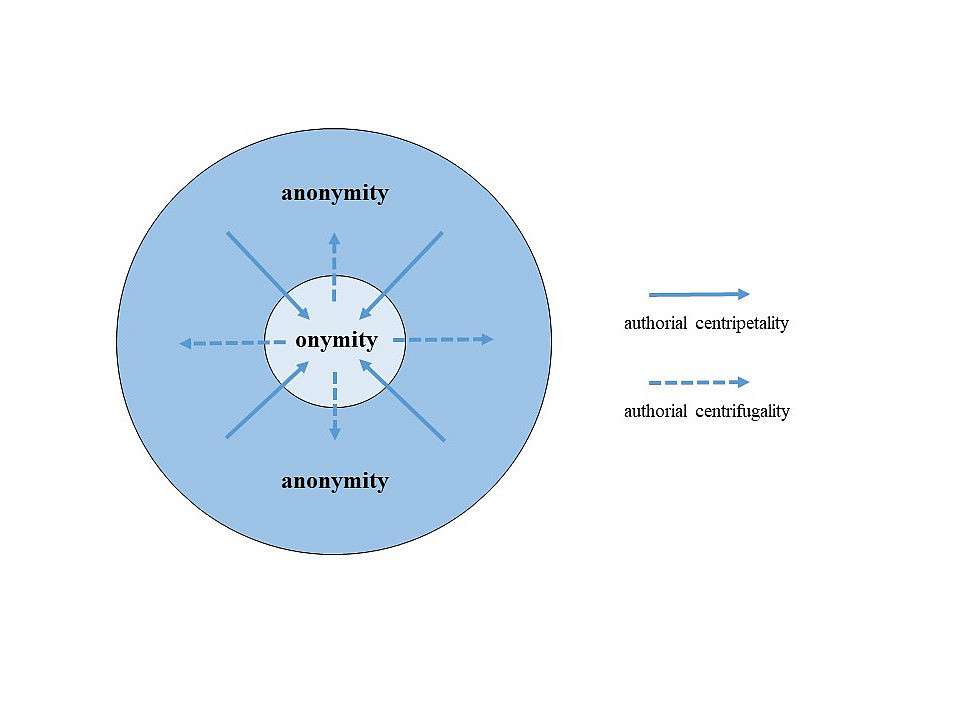Work packages
We provide an overview of the individual project phases.

Three of COLLAPSE’s work packages investigate the centripetal power of the author’s name in the attribution of Greek texts (I.1-3). The other three work packages analyze the dynamics of anonymization and examine the centrifugal forces of anonymity (II.1-3).
Subprojects
Subproject I.1 Appropriating the author, collaborating with the past in pseudepigraphical Imperial Greek Poetry
Work package I.1 (PhD project: Appropriating the author, collaborating with the past in pseudepigraphical Imperial Greek Poetry) looks at the authorial impersonations of model roles and authorial positions in the pseudepigraphical Imperial epic and didactic poetry. It explores how these poems expansively continue works by a particular author and how they appropriate and transform a particular authorial image. So far, only individual studies have been conducted on these poems and their individual poetology; a comparative study that establishes new points of combined emphasis is still lacking. This work package will shed new light on these poetic mechanics by establishing a scale or typology of different authorial collaborations and highlighting how those imperial authors appropriated and sought to imitate, transform, or even replace, earlier authors.
Subproject I.2 The abridging Muse - exploring the poetics of elleipsis
Work package I.2 (PhD project: The abridging Muse – exploring the poetics of elleipsis) deals with several groups of Greek texts from the Imperial Period that have been underrepresented in research to date. Taking the form of a sort of ancient Reader’s Digest, these include textual abridgements and paraphrases of particular works. Their anonymous authors were, as a rule, disregarded because of their allegedly inferior and unadorned style, or their ‘elliptical’ literary qualities. By contrast, the present work package undertakes an evaluation of the literary and aesthetic strategies of pseudepigraphical abridgments. By shortening a larger work, later authors offered ‘condensed’ and selective yet innovative texts, and ennobled themselves through the claim of quintessential brevity. A comparative look will be taken at different small textual forms written ‘under the mantle’ of famous authors in retrospect.
Subprojects I.3.1 and I.3.2 Transforming the Imperial Prose author from within - the mechanics of Imperial and Late Antique pseudepigrapha in the context of the larger works of Lucian and Plutarch
Work packages I.3.1 and I.3.2 (PhD projects: Transforming the Imperial Prose author from within – the mechanics of Imperial and Late Antique pseudepigrapha in the context of the larger works of Lucian and Plutarch) deal with texts or groups of texts that have been transmitted within the large works of the prominent Imperial prose writers Lucian and Plutarch. They examine the relevant pseudepigraphical texts in relation to other works of the particular author. Moreover, they ask about commonalities or differences as well as the stability or fragility of boundaries within such accretions of earlier and later texts. Far from forging unintellectual creations, the pseudepigraphical authors produced early-acknowledged experiments under their revered master-author’s name – or their texts were deemed, e.g., genuinely ‘Lucianic’ or ‘Plutarchic’, and thus worthy of entering a corpus. Therefore, both work packages consider the literary strategies of such collaborative writing in order to better determine the aesthetic, transformative, and poetical mechanics of pseudepigraphy.
Subproject II.1 Against the despotism of the author - contrasting pseudepigrapha with anonymous texts
Work package II.1 (Postdoc project 1: Against the despotism of the author – contrasting pseudepigrapha with anonymous texts) moves on to collections of adespota, i.e. texts ‘without a master’. It looks at poetic compositions that were transmitted without an author’s name in Imperial Greek texts. Thus, it challenges one of Classical scholarship’s biggest – and oldest – obsessions: to connect a given text to the name of its author. The project focuses on anonymous texts of the Imperial Age. It also investigates the relationship between poems, which the dominating author-centrism ascribed to legendary authors in retrospect, and quotations of completely anonymous texts that were not attached to a composer. In antiquity, long before the introduction of copyright, ‘ownerless’ texts appeared as a universal ‘commons’.
Subproject II.2 Impersonating the tradition - masterless knowledge in Greek scientific writing
Work package II.2 (Postdoc project 2: Impersonating the tradition – masterless knowledge in Greek scientific writing) deals with authorless knowledge in Greek scientific texts. Many scientific texts from Imperial times were either primarily or secondarily ascribed to legendary authors. Other texts do not seem to be obsessed with authority, and the knowledge contained in them had validity even without authorial anchoring. The project explores the reasons for such anonymity and provides impulses for a better understanding of the authorial mechanics by which authorless works and collections – that are often devalued as ‘non-literary’ – enrich Imperial Greek science writing.
Subproject II.3 A brief history of anonymous Greek literature
Work package II.3 (PI project: A brief history of anonymous Greek literature) brings together all the strands of the other work packages of COLLAPSE. It focuses on anonymous Greek literature of the Imperial Period and texts from various fields and areas of knowledge, such as religious (e.g. early Christian) and science writing. At the same time, comparisons will be made with anonymous traditions and authorless texts of earlier epochs of Greek literature.
Work package II.3 (PI project: A brief history of anonymous Greek literature) brings together all the strands of the other work packages of COLLAPSE. It focuses on anonymous Greek literature of the Imperial Period and texts from various fields and areas of knowledge, such as religious (e.g. early Christian) and science writing. At the same time, comparisons will be made with anonymous traditions and authorless texts of earlier epochs of Greek literature.
All work packages of COLLAPSE are closely related. For assumed authorship, or author-centricity (esp. work packages I.1-3), and anonymity (esp. work packages II.1-3) are two sides of the same coin. Work packages I.1-2 lay the foundations for COLLAPSE in a complementary way. Whereas I.1 analyses the expansion, via continuation or variation, of canonical texts in pseudepigraphical literature of the Imperial Period, I.2 is devoted to abridgements and miniaturizations. Both work packages I.3.1 and I.3.2 then connect both strands and look for pseudepigraphy and author-fictions in the mixed corpora of Lucian and Plutarch.

For all work packages, the centripetal forces of the author’s name and a questioning of the boundaries between different authors are central. Comparable to the relationship between author and narrator and the impersonation of roles, ancient recipients could differentiate between authorial models and such texts that skillfully adopted, imitated, or competed with, these models. Although the boundaries between primary authorship and author-fiction seemed to disappear in the process, the audience approved of precisely such an exploration of boundaries. Based on this, work packages II.1-3 deal with the centrifugal forces of authorship and explore the interconnections between pseudepigraphy and anonymity. II.1 looks at complementary procedures in Imperial poetic texts, II.2 at scientific writing.
All threads spun in the other areas come together in each work package, as can be exemplified by II.2. With I.1 it shares the theme of traditions enriched through added texts. With I.2 it shares the analyses of textual abridgements such as epitomai or syntheses. Like both I.3.1 and I.3.2, it examines pseudepigraphical texts in larger, mixed corpora. Finally, with II.1 and II.3 it combines the comparative study of attributed and anonymous texts. As becomes clear from these interconnections within COLLAPSE, all work packages will be in close dialogue and constant exchange, as will be documented also by II.3.